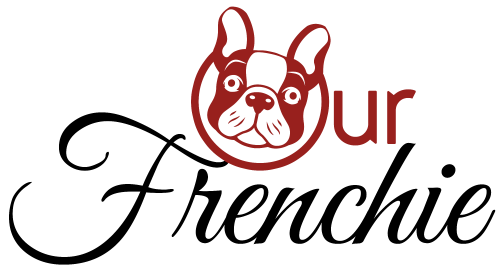Health & Care
Common French Bulldog Health Problems
Page Contents
There are French bulldog health problems that are easy to deal, and there are more complicated ones. According to research, 72% of French bulldogs had at least one of these health problems like: skin problems (17.9%), ear infections (14%) or diarrhea (7.5%).
Part of the health issues can be treated at home and there is no need for veterinary interference.
What Percentage of French Bulldogs Have Health Problems?
The Royal Veterinary College, UK, published a paper in 2018 regarding French Bulldogs. It found that 72.4% of French Bulldogs had one, two or, more common health problems. These health problems included diarrhea (7.5%), ear infections (14%), and conjunctivitis (3.2%), and skin problems (17.9%). The research also found that male French bulldogs had a higher percentage of health issues than females.
1. Brachycephalic syndrome
These French bulldog health problems result from their skull structure, where their nose is flat, making it harder for your Frenchie to breathe easily.
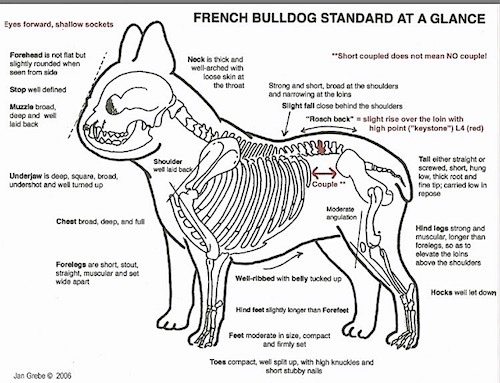
Therefore, your Frenchie might be exhausted even after a short walk or the simplest exercises. On hot weather days, you might notice that your French bulldog is constantly panting.
If your Frenchie keeps panting for a long time on a hot day, hose him down with cold water for about 15 minutes or till he seems to be calm. If the panting continues, it is advisable to visit your vet.
Due to their narrow nostrils and trachea, French bulldogs tend to snore and have loud breathing. Most of these breathing problems could result in the death of your dog. And studies have shown that this is one of the most common French bulldog health problems that lead to their early demise.
Treatment
However, there is a way to save your Frenchie by undergoing a surgical procedure, wherein a portion of their soft palate is removed. This procedure showed an increase of up to 60% of better air passage to their lungs.
2. Laryngeal Collapse
This condition usually develops when the Frenchie has a long history of suffering from the brachycephalic syndrome. This condition develops when there is a loss in the support and rigidity of the laryngeal cartilage which in turn causes the voice box or larynx to collapse.
When your dog has problems of brachycephalic syndrome for long periods, it puts a lot of pressure on the respiratory system.
Therefore, it is essential that you treat the following problems at the earliest before they lead to further complications:
- Everted laryngeal saccules
- Elongated soft palates
- And stenotic nares
Treatment
You can treat mild cases of this condition by enlarging the stenotic nare (nostrils). Removing obstructive, excessive tissue inside the throat. And in advanced cases, by surgically removing portions of the collapsed cartilages or permanently removing the tracheostomy.
3. Heat Strokes
Under this, we will further examine in detail French bulldogs and heat strokes.
As mentioned earlier, due to their facial structure, French bulldogs are more susceptible to respiratory problems than other breeds of dogs. Which can result in heat strokes.
Their soft palate blocks the airflow to the trachea. French bulldogs are, more often than not, prone to respiratory health problems and heat strokes. These heat strokes are often triggered by hot weather conditions or light activity during such weather.
Some airlines have also banned French bulldogs in their cargo. As there have been reports of these breed of dogs dying in the cargo hold due to excessive heat.
Symptoms of Heatstroke:
- Excessive panting and drooling
- Difficulty breathing
- Bloody diarrhea or vomiting
- Redness of gums
If your French bulldog seems to have these symptoms, you might need to visit the vet. Your vet will guide you on how to bring down your dog’s temperature safely.
In severe cases, your dog might faint, have seizures, and these can sometimes even lead to death.
Treatment
Some preliminary cautions you may want to remember, never leave your dog in the car or on sidewalks and limit your dog’s activities, especially during peak temperatures. Frenchies don’t need much heat to get hot. Sometimes they start to gasp in 68°F (20°C).
You may also want to keep in mind that if your dog has had a heatstroke once, it will most likely happen again. Therefore, you must pay extra attention to your Frenchie health at all times.
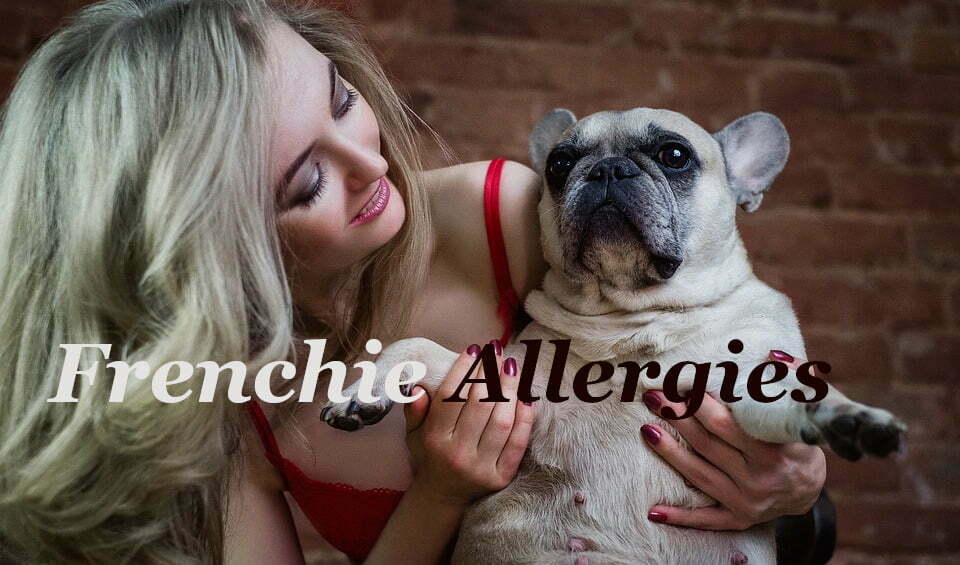
4. Food Allergies
Another typical French bulldog health problem that afflicts most of these dogs is food allergies. Mostly related to proteins, which means your Frenchie should consume more lean meat.
Food allergies can affect their stomach and intestinal tracts. This health problem is also medically known as ‘French bulldog inflammatory bowel disease’.
This health issue can be treated by giving your Frenchie a special diet and immunosuppressive agents or anti-inflammatory drugs, as prescribed by your physician.
Symptoms of Food Allergies:
- Abdominal pain. A Frenchie might show signs of loss of appetite and lay on the floor flat on its stomach. Or unable to lift itself
- Vomiting
- Diarrhea
- Weight loss
- Bloody stool
- Itchy skin
- If your dog’s stomach seems to be making rumbling noises
If your dog shows signs of any of the above symptoms, it is advisable to bring the dog to a medical professional.
Food that can cause stomach infections:
- Meats like chicken, beef, lamb, pork, etc.
- Dairy products that are not suitable for their immune system
- Egg, Corn, Soy, Fish, Rice, etc.
- Cigarette smoke
- Perfumes and cleaning products
- Your dog may also be allergic to some prescription drugs
However, it does not mean you cannot feed your Frenchie any of the food items listed above. You must know your French bulldog and all health and diet-related information about your dog.
Treatment
You can try eliminating certain food items in your dog’s diet and replace them with a portion of prescribed dog food.
After a month or so of feeding the prescribed food, you can slowly reintroduce a regular diet. If the inflammation or allergies return, you can be sure that your dog has food allergies. In that case, you need to observe and identify the diet causing the allergies. After that take proper caution in your dog’s diet.

Once you are completely informed about your Frenchie, you can be sure to provide optimum support and care for them.
5. Environmental Allergies
Environmental allergies are another French bulldog health problem. Some common allergens in the air commonly caused by pollen, mold, bugs, and dust. Can prove to be quite hazardous for your dog’s health.
Symptoms of Environmental Allergies:
- If Your dog is constantly licking their paws
- Has watery eyes
- If your dog is excessive and regularly scratching itself
- Has raw patches on its skin or is visibly dry and scaly
- Ear infections that seem to occur most often
- Diarrhea or Vomiting
However, diagnosing your dog’s allergy can prove to be quite tricky and complicated. Your vet will not analyze the exact cause of allergy, given the many factors involved.
A professional vet will most probably use the method of eliminating food items from your dog’s diet. Rule out the possibility of food allergy, and narrow down the diagnosis.
Alternative option which will give you much faster answers but costs money are DNA tests.
Environmental Allergies Treatment
Despite being allergic to some environmental substances, you can still take steps to maintain your Frenchie’s health.
1. Medication – Typically, the vet will prescribe antihistamines and corticosteroids to help your Frenchie to stop scratching. The strength and type of medication will depend on according to the severity of the allergy. If the allergic reaction includes rashes or atopic dermatitis, the use of topical ointments will be necessary.
2. Keep your Home Clean – Despite regular cleaning, there are some places around the house where dust collects. By finding and cleaning those areas regularly, and ensuring that your dog’s space is clean, you can help improve your dog’s health. You can consider keeping aside large, thick rugs and carpets that tend to attract the most allergens inside your home.
3. Grooming – Since French Bulldogs have many skin folds, remember to clean them regularly to prevent dust and dirt accumulation.
4. Allergy Shots – Although giving your Frenchie allergy shots will not cure its allergies, they will help the dog become less allergic to the substances. Immunotherapy helps dogs cope better with environmental allergies, especially seasonal ones.
6. Skin Allergies
If your Frenchie has a food or environmental allergy, they will mostly show up as skin allergies. They can occur when the dog is hypersensitive to a particular type of food or environmental substances. However, skin allergies are often a result of compromised – quality dog foods or poor breeding.
Besides these factors, one major cause of skin allergies are fleas, in which the dog’s skin shows a reaction to the saliva of the flea after it bites. Fortunately, it is very easy to treat allergies caused by fleas.
The final stage of allergic skin reactions in a dog is known as Allergic dermatitis, which is very painful and uncomfortable. But most dog skin allergies are treatable if you take the right approach. A simple diet change can easily treat skin allergies in a French bulldog. But how would you know, and what should you do if it has reached the phase of Atopic dermatitis?
Symptoms of Skin Allergies
The symptoms of Atopic dermatitis are quite obvious in dogs. If your Frenchie has it, you will notice excessive scratching and itching, rubbing on surfaces, hair loss, flaky skin, and excessive biting on the affected area. If you see these signs, you have to act immediately as it may lead to secondary issues and cause other infections like seborrhea.
Treatment
The number of treatments for Atopic dermatitis depends on how severe the allergy is.
1. Anti-itch Treatment
To ensure that your French bulldog’s skin recovers quickly, you will need to make it stop scratching the irritated area. The more it scratches the itchy parts, the worse it will get. Get topical treatments like hypoallergenic lotions and shampoos that will reduce the itchiness.
2. Anti-bacterial and Anti-yeast Treatment
If you notice that the rashes have caused a bacterial or yeast infection, look for antiseptic creams, lotions, and shampoos that will sterilize the infected area. These treatments will control the bacterial or yeast growth on the skin and also help produce skin sebum.
3. Add Natural Supplements to French bulldogs Diet
Including fatty acids in your Frenchie’s diet will make its skin healthier and rash-resistant. You will find lots of food supplements that contain these nutrients. Also, one tasty solution for allergy maintenance in French bulldogs is to give them chewable supplements.
Your vet will then follow with testing of intradermal skin allergies. Most vets recommend soothing shampoos, antibiotics, and topical ointments. To help your furry friend with all the itching and other skin-related health problems.
7. Cleft Palate
Another health problems are Cleft Palate. You might be surprised to know that a French bulldog can also be affected by cleft palate. Cleft is usually referred to as the outside of the lip. In case of deformity, teeth and gums protrude outside, or the lips are gapped.
The palate is referred to the upper inner roof of the mouth, and deformities in the palate can be hard to correct unless a surgical procedure is done.
Primary cleft defects are easily detectable and corrected with cosmetic procedures; however, secondary palates may be challenging to detect and most often require surgery for correction.
However, you can rest assured as this is a reasonably common deformity in French bulldogs due to their flat face structure and is a congenital disability. Most often, pet owners cannot do much to prevent this deformity.
Cleft Palate symptoms:
- A chronic running nose means your dog is always with a runny nose
- Excessive snorting or sneezing
- Bouts of cough while drinking water
- Difficulty breathing after little activity
- And signs of difficulty in eating
French bulldog owners often take these symptoms lightly, as they do not seem to be different from their usual health problems.
However, it would be wise on your part to visit your vet if your French bulldog exhibits these signs.
Furthermore, detecting a soft palate may require your dog to be under general anesthesia as the procedure can be uncomfortable for your dog.
Some breathing problems like pneumonia and upper respiratory illness can be ruled out during this procedure.
Treatment
As mentioned earlier, cleft palate can be corrected with surgery if it is too severe. A secondary palate can cause recurring respiratory problems for your dog. Dogs with cleft palate are prescribed soft food, a lot of liquid, and antibiotics.
8. Intervertebral Disc Disease
Intervertebral Disc disease (IVDD) is most often diagnosed in a short-legged breed of dogs or dwarfism. French bulldogs, because of their short legs, are more prone to this disease.
This condition is commonly detected in dogs between the ages of 4 to 8. However, dogs below the age of two have also been diagnosed with this disease.

If affected with this disease, your dog’s symptoms are hunch back and pain in the neck and back. This particular French bulldog health problems can be challenging to detect for homeowners.
As the dog does not depict any dangerous physical signs of pain. You can detect Intervertebral Disc disease by observing your Frenchie. If your dog loses interest in food or has difficulty turning its head, it might be because of pain in the neck.
You can detect back pain in your dog if he is not as jumpy or aggressive when you try to pick it up. In severe cases of back pain that affects the spinal cord, it can lead to neurological health problems.
This means your dog will become hunched, have odd gaits of walking, no longer climb stairs, run around, and even paralyze.
Cause & Treatment
Intervertebral disc disease can be caused by repetitive injury to the back or from excessive physical activity. If you notice any of the above signs of Intervertebral disc disease, you must rush to your vet.
Any physical movement or non-treatment of this disc disease can worsen the condition of the dog.
Most often, a vet will take an X-ray to get better information on the spine’s condition. The vet will most commonly look for a calcified disc.
In most cases of this Frenchie health problems, the vet might ask for an MRI or a CT scan to properly locate the calcified disc. This helps the vet to diagnose your dog correctly.
However, if you do not wish for surgery, the vet will prescribe anti-inflammatory medications and strict bed rest and allow the body to heal itself.
9. Hemivertebrae
Most pet owners confuse Hemivertebrae and Intervertebral Disc Disease. Simultaneously, both are related to spinal disease. The hemivertebrae results from malformation in one or more vertebrae resulting in a wedge-shaped triangle.
It is usually neither not life-threatening nor causes any pain. In sporadic cases, though, the bone structure can press down on the spinal cord causing discomfort for your dogs like weakness, pain, or even paralysis.
This is currently no treatment for this condition unless there is pressure in the spinal cord. And since this condition is sporadic, there is very little for you to worry about.
10. Infections in the Ear
There are three main types of infections. Infection of the outer ear (otitis externa), Infection of the middle ear (otitis media), and Infection of the inner ear (otitis interna).
There is very little to worry about this French bulldog health problem, as it is easily treatable by a medical professional.
Allergies from the environment, yeast, or bacteria are some common causes of this Infection.
Although this disease is treatable, you must note that it can be pretty painful and uncomfortable for your French bulldog.
It is essential that you seek medical attention for your dog as soon as you notice redness in the ear. Excess goop if your dog is excessively shaking its head and pawing at the ears – to prevent further Infection in the middle and inner ear.
11. Conjunctivitis or Prolapsed nictitans gland
Conjunctivitis is the condition where the eyes appear to be red. This is because of an inflammation that screens the tissue of the eyeballs and the lines within the eyelid.
Symptoms are constant blinking, squinting, swelling, and discharge. If the Infection is diagnosed to be bacterial, the vet commonly prescribes antibiotics.

Conjunctivitis is also known as ‘Cherry eye,’ is relatively common among French bulldogs; this condition causes the dog’s tear gland to protrude outside and moves out of its place and appears in the corner of the eyes as red swelling.
Most often, the tear gland moves back into its position on its own. In worst-case scenarios, your dog may need to undergo surgical procedures to tuck the tear gland back into place.
Many pet owners speculate as to why this condition appears on dogs, and so far, it has only been concluded as hereditary or genetic.
There is a higher percentage of male French bulldogs to be easily infected with some of the most common French bulldog health problems.
12. Ulcerative Keratitis
Most pet owners confuse ulcerative keratitis with cherry. However, they are very different conditions.
Ulcerative keratitis is caused by blunt trauma. Like when your dog hits their eye from a tree branch, by rubbing their face on the carpet, from injuries sustained from a cat scratch. Or from playing with other dogs, or when a foreign object is stuck inside the eyelid.
This condition occurs when the dog’s cornea is affected. It can lead to red-eye (similar to a cherry eye), scratching the eyes, swelling, and discharge.
You can look out for these symptoms and take necessary actions yourself. Like applying a saline solution to the eye or visit the vet in severe cases.
Your vet will commonly apply a special dye to locate the ulcer area in the eye and properly study the condition by lighting a lamp to it.
Treatments for this condition include tablets, eye drops and ointment. Less possible – surgery. Vet will start with options that not contains surgery.
13. Overgrown Nails
When your Frenchie’s nails are overgrown, it can lead to limping. As they cannot place their paws entirely on the ground, which can further cause joint problems.
It can also lead to twisting when the nails get stuck on something, which can further lead to dislocating of the toe or bones.
However, if you are a French bulldog owner, you must have noticed that it is no easy feat to clip your dog’s nails. Frenchies do not like their feet touched and often convey these emotions by squealing loudly when you feel their paws.
It is essential to trim your dog’s nails as they can curl downwards. And when the nails start to grow back, they will naturally grow under the skin. Which can be painful for your dog and risk Infection.
Check out French bulldog nail trimming tips and tricks here.
14. Skin Fold Dermatitis
Skin fold dermatitis results from Infection in skin folds, mostly among French bulldogs, American bulldogs, Pugs and English Bulldogs.
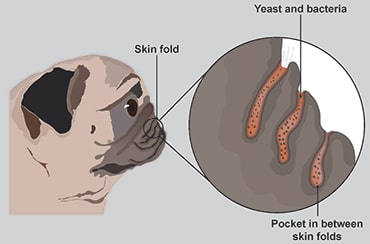
This disease is caused by inflammation between the skin folds. Mainly the region around the face, nose, armpits, tail, toes, and vaginal folds.
This condition is easily visible to the naked eye, and you can detect it by looking for signs of inflammation between the skin folds, itching, scratching, and redness around the area.
Since your French bulldog has lots of skin folds, they are more susceptible to this disease due to the moisture trapped between the skins.
Therefore, as a French bulldog owner, you may want to check and clean your dog’s skin folds regularly.
Be careful not to miss the skin folds on their paws and feet. Moisture can also be trapped there, giving way for bacterial and yeast Infection almost similar to a human athlete’s foot disease.
Most female French bulldogs suffer from vaginal skin fold dermatitis. But it is difficult to detect because of the position of the vaginal anatomy tucked between the folds.
As a French bulldog pet owner, you must ensure that your dog is always dry and regularly clean between the skin folds. If left unattended, these can result in Infection from fungus, yeast, and bacteria.
15. Pyoderma – Wounds
This health issue is caused when your dog’s cuts and wounds get infected with bacteria.
This is relatively easy to treat. Your vet will most commonly prescribe an antifungal or antibiotic before cleaning the wounded area.
However, you must not take this health issue lightly as aggravated infections can lead to the wound becoming septic, resulting in amputation and limb loss.
16. Colitis or Granulomatous Colitis Bacteria
This disease is mostly diagnosed among French bulldogs and boxers or sometimes even mastiffs breeds.
This is a severe form of bowel infection caused mainly by specific bacteria known as E .coli. Research has found this disease to be hereditary among a particular breed of dogs like the French bulldog.
The E .coli bacteria are usually found in the intestinal linings of a dog. This bacterium invades the intestines causing blooding diarrhea and loss of appetite.
It is always advisable to visit the vet if your Frenchie exhibits such symptoms. However, if you wish to administer over-the-counter medications yourself, you can try non-specific treatments, like fasting your dog for 24 to 48 hrs.
The fasting will help flush out the bacteria on its own. You can feed your dog a hypoallergenic diet that has a lot of fiber content.
17. Patellar Luxation (dislocation)
Unfortunately, the Patellar Luxation is primarily common in the short-legged breed of dogs. Which means your French bulldog is also affected by this condition. It affects them from a very young age.
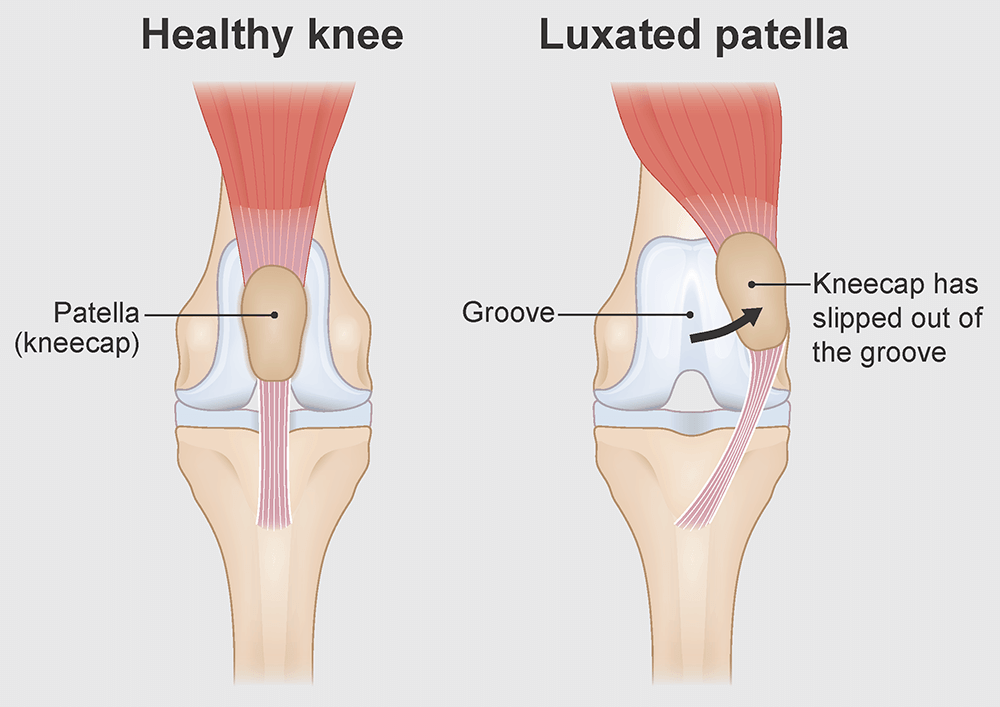
If your Frenchie has this condition, the joint on his knees or kneecap will be affected, as we commonly know it. If your dog’s bones and muscles are aligned, then your dog’s knee joints are stable.
However, when the bones and muscles are misaligned, the muscles on your dog’s knees pull inwards towards the bone, causing abnormal stress to the bone structure.
This causes the patella to fall out of place. The patella keeps popping in and out of place, which can eventually lead to arthritis and other degenerative bone diseases.
This condition in dogs is graded from grade 1 to grade 4 by the orthopedic vet. Surgery is usually recommended for conditions from grade 2 and above.
The early stages of Patellar Luxation can be treated manually. Still, in the advanced cases, the orthopedic vet will reconstruct the tissue surrounding the knee cap and place the knee cap into place. And tightening the opposite end.
18. Deafness
Hearing defect in French bulldogs is all too common. A majority of the dogs are born with this defect as it is genetic and in older dogs it develops as they grow.
However, you can get your dog tested when they are still a puppy. When at least six weeks old, try a test known as the BAER test. These tests are provided by veterinary clinics. But not always all veterinary provide that kind of service.
You can also pre-determine the condition of your Frenchies ears by the color of its coat and as astonishing as it sounds. This defect is usually associated with the white color coat owners, blue eyes and patches of black Frenchies.
Role of color in deafness
This is due to the presence of a gene known as the ‘piebald gene’, and when this gene is present in the dog, there is a lack of pigment cells that are responsible for its appearance.
Therefore, due to the lack of these pigment cells, very fine hair that are present inside the ears, also known as ‘cilia’, are not able to develop properly inside the ears and thus resulting in deafness.
This defect is also common in merle French bulldogs. Most pet owners and professionals would advise you against getting a merle French bulldog from breeders due to its notoriety for multiple health issues.
Some symptoms you can look out for are:
- When your Frenchie is not responsive to sounds
- Not responsive to its name or woken by the sound of loud noises
19. Von Willebrand’s disease
This condition is a chronic, congenital bleeding disorder. It is similar to a condition in human known as Hemophilia. This condition is the result of deficiency in adhesive glycoprotein which is required for the blood to normally bind platelet clotting.
Symptoms include blood in the stool, bleeding gums, extreme vaginal bleeding, prolonged bleeding after trauma or surgery. Also, regular nosebleeds, bloody urine, skin bruises, and anemia blood loss.
French bulldogs affected by the Von Willebrand’s disease will have excessive bleeding after injury or surgery because their blood cannot clot well.
Von Willebrand’s disease in its early stages is neither life-threatening nor life altering. Most often, it does not require any special treatment.
In severe cases of bleeding episodes you need to monitor the activities of your Frenchie and your vet might suggest blood transfusion before any surgery.
20. Distichiasis
This condition is hereditary in which some dogs have an eyelash growing in an abnormal location or direction.
This condition may seem mild but if left untreated can lead to: corneal ulcer, bacterial infection, corneal scarring, hyperpigmentation and sometimes even blindness.
If you notice Distichiasis in your French bulldog, you can monitor the following symptoms:
- Inflammation in the eye
- Eye discharge
- Corneal ulcers
- Eye pain
- Excessive squinting or blinking
- Excessive tearing
If you notice any of the above symptoms it is crucial that you seek medical help at the earliest.
Your vet will conduct a thorough examination of the eye to diagnose Distichiasis. These tests will often include checking the level of fluid in the eye, analyzing the intraocular pressure of the eye, and checking the tear production of your dog.
Most often you can easily treat this condition by performing surgery. You might want to remember that your dog may need this surgery several times over the course of their lifetime.
This surgery is usually carried out during when they become adults. Kindly note that you should not attempt to remove Distichiasis/abnormal eyelash on your own. As it may result in permanent visual damage to the eye.
Conclusion of French Bulldog Health Problems
If you want a healthy French bulldog, you must ensure that the breeder you are dealing with is reputable and ethical to avoid the chances of having a pup with genetic French bulldog health problems.
You can always ask for a family proof that dates back to five generations at the least to ensure that there are no genetic health issues with your French bulldog.
Getting an insurance cover for your French bulldog is a smart idea, considering the many French bulldog health problems they come with.
You can get insurance for your dog when they are perhaps a year or so. This will ensure that your insurance covers most of the hereditary and genetic health issues, although some insurance may exclude common health problems. Check best insurance companies for French bulldogs here.
The average insurance can cost you from as little as $10 up to $100. The insurance cost is usually based on the French bulldog’s current health and age.
Good Side of Health Problems
It is not as bad as it sounds. It does not mean that your French bulldog will have these listed health issues. In fact, your Frenchie probably will have none of these issues. This article is not about – “how bad are French bulldogs” or “How rich are Frenchies with health issues”. These problems might be, and we are here to inform about them.
You can make an informed decision about whether you would like to bring this furry friend into your family. If you do decide on bringing him home, make sure to take proper care of your Frenchie!
Thank you for reading and supporting OurFrenchie.com community!
